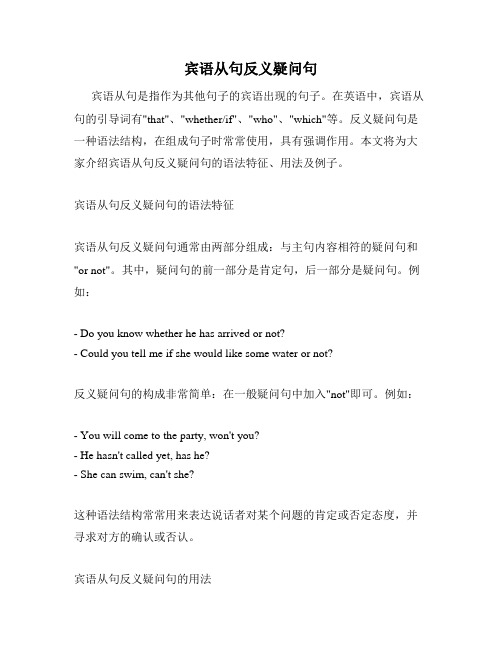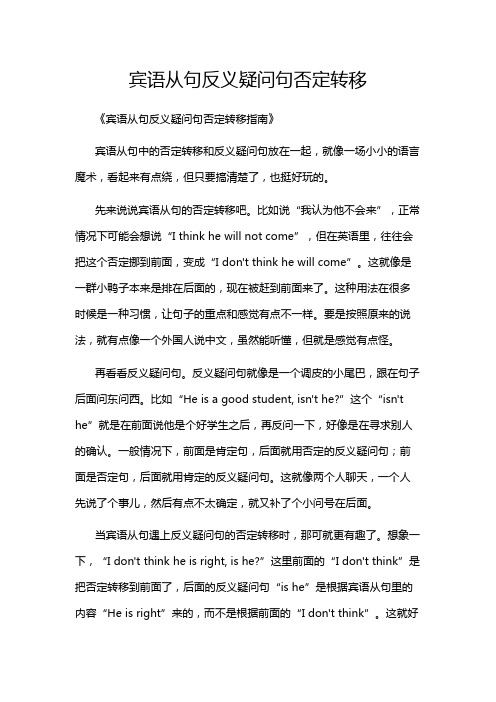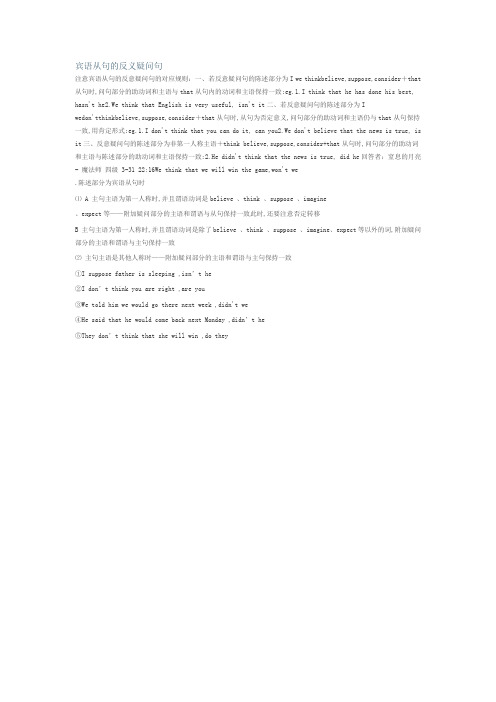中考英语复习——宾语从句的反义疑问句
广东中考英语专项--反义疑问句语法讲解及练习(含答案)

一、反义疑问句的基本结构与形式反义疑问句(The DisjunctiveQuestion) 即附加疑问句,是英语四大问句之一。
它表示提问人的看法,没有把握,需要对方证实。
句尾升调表示疑问,降调表示反问。
反意疑问句,由一个陈述句加上一个短问句而构成,基本构成形式是:陈述句+动词(肯定或否定)+主语?如:①She often has lunch at school, doesn’t she?②You don’t like sports, do you?反意疑问句通常对应规则:一)、反意疑问句中问句部分的动词与陈述部分的动词在语气上成相反的对应关系,即:)肯定+否定?否定+肯定?如:①You can’t do it, can you?②They are very late for the meeting, aren’t they?二)、反意疑问句中问句部分的动词与陈述部分的动词种类要对应一致。
如:①He has supper at home every day, doesn’t he? (不能用hasn’t he?)②They have known the matter, haven’t they? (不能用don’t they?)三)、反意疑问句中问句部分的动词在时态上应和陈述部分的时态一致。
如:①They will go to town soon, won’t they?(不能用don’t they?或aren’t they?)②He works very hard, doesn’t he?(不能用didn’t he?或won’t he?)基础练习1. You are an actor, ________ _____ ?2. He is a good boy, ________ ______ ?3. It was fine yesterday, _______ ___ ?4. You were studying when I called you last night, __________ _____ ?5. She is going to visit me, _____ ____?6. I am Chinese, ______ ____?7. It often rains here, ________ ___ ?8. He likes soccer, _________ ____ ?9. You have a headache, _______ ___ ?10. I called you yesterday, _______ __?11. You will go to America, ______ ___ ?12. We have ever been to Shanghai, _________ ______ ?13.His mother is a doctor, ______ ____ ?14. The dogs are fighting, _______ _____?15 There is a boy in our classroom, _______ _______ ?17. There were many cars in the street,_________ ________ ?18. There will be robots in our families,________ ______ ?19. Sit down please, _______________ ?20. Please call me, _________________?_________ ?21. Let’s go home,22. Let us go home, ________________ ?23 . Let me see, __________________ ?答案1.aren't you 2.isn't he 3.wasn't it 4.didn't you 5.won't she 6.aren't 7.doesn't it 8.doesn't he9.don't you 10.didn't you 11.won't you 12.haven't we 13.isn't she 14.aren't they 15.isn't there 17.weren't there 18.won't there 19.will you 20.will you 21.shall we22.will you 23.will you二、反义疑问句的回答反义疑问句的回答始终遵从事实,事实是肯定用Yes+肯定句,事实是否定用no+否定句,如事实是你喜欢英语:You like English,don't you? Yes,I do.(是的,我喜欢。
宾语从句反义疑问句

宾语从句反义疑问句宾语从句是指作为其他句子的宾语出现的句子。
在英语中,宾语从句的引导词有"that"、"whether/if"、"who"、"which"等。
反义疑问句是一种语法结构,在组成句子时常常使用,具有强调作用。
本文将为大家介绍宾语从句反义疑问句的语法特征、用法及例子。
宾语从句反义疑问句的语法特征宾语从句反义疑问句通常由两部分组成:与主句内容相符的疑问句和"or not"。
其中,疑问句的前一部分是肯定句,后一部分是疑问句。
例如:- Do you know whether he has arrived or not?- Could you tell me if she would like some water or not?反义疑问句的构成非常简单:在一般疑问句中加入"not"即可。
例如:- You will come to the party, won't you?- He hasn't called yet, has he?- She can swim, can't she?这种语法结构常常用来表达说话者对某个问题的肯定或否定态度,并寻求对方的确认或否认。
宾语从句反义疑问句的用法宾语从句反义疑问句在日常生活中经常使用。
下面列举几种常见的用法:1. 表示询问宾语从句反义疑问句最常见的用法之一是表示询问。
例如:- Do you think she will come or not?- Could you tell me whether the train has left or not?2. 表示不确定有时候我们不确定自己所说的话是否正确,这时宾语从句反义疑问句就派上用场了。
例如:- She's from Germany, isn't she?- He said he'd be here at five, didn't he?3. 表示强调宾语从句反义疑问句还可以用来强调说话者对一件事情的看法。
含有宾语从句的反义疑问句

含有宾语从句的反义疑问句在生活中,反义疑问句总是能带来一些小乐趣。
想象一下,你和朋友在咖啡馆聊得火热,突然有人问:“你喜欢喝咖啡,不是吗?”这种问法听起来既简单又有趣,对吧?你可能会点头答应,或者反驳说:“其实我更喜欢茶!”这样的句式像是在开玩笑,实际上却能引出更深层的对话。
就拿我的朋友小明来说吧。
小明特别爱运动,每次聚会前,他都会兴致勃勃地问:“你们准备去健身吗?应该去吧?”有时候我就会想,谁会拒绝呢?大家都知道健身对身体好。
可是,偏偏我总是想找借口:“哎呀,今天没时间,可能明天吧!”而小明则笑着回应:“明天又是明天,今天才是今天呀!”说的没错,咱们总是找借口,直到最后变成“明天再说”的惯例。
再比如,有次我和同事一起吃午餐,他一边吃汉堡一边问:“你觉得这个汉堡好吃吗?真不错吧?”我一边咀嚼一边点头,心里想着这真是太美味了!但其实我心里暗想,还是那碗面条更合我胃口。
不过我嘴上没说出来,最后只是附和:“对呀,超级好吃!”同事接着补充:“不过你喜欢面条嘛?”这时候,我只能笑笑,心里暗自承认自己的“小秘密”了。
在生活中,我们时常面对这样的场景。
比如,周末去看电影,朋友会问:“你觉得这部电影真有意思吗?应该值得一看吧?”我立刻想起了上次看得那部无聊透顶的片子,心里却不想让气氛冷下来,于是干脆说:“哦,对呀,特别精彩!”真是让人哭笑不得。
这些反义疑问句就像是调皮的小精灵,轻轻一戳,就能引发一阵欢笑。
反义疑问句不仅仅是为了调侃,很多时候它们还在传递一种情感。
比如,情侣之间在聊天时,女方可能会问:“你是不是还在想我?不然你怎么不发消息?”这时候,男方就得绞尽脑汁思考:“我当然想你,只是忙嘛!”真是让人感到又甜蜜又无奈。
这样的句式让人觉得既有趣又有温度,生活中的小细节常常在这种互动中悄然流露。
说到这里,反义疑问句简直就像调味品,增添了生活的色彩。
每当我们用上这样的句式,总能引发一些意想不到的反应。
有一次,我的朋友跟我说:“你知道最近的新餐馆吗?一定很好吃吧?”我立马想起上次去的那个奇葩地方,心中忍不住反问:“真的吗?上次你推荐的那个地方我还没缓过来呢!”这就是生活,充满了幽默和惊喜。
宾语从句反义疑问句否定转移

宾语从句反义疑问句否定转移《宾语从句反义疑问句否定转移指南》宾语从句中的否定转移和反义疑问句放在一起,就像一场小小的语言魔术,看起来有点绕,但只要搞清楚了,也挺好玩的。
先来说说宾语从句的否定转移吧。
比如说“我认为他不会来”,正常情况下可能会想说“I think he will not come”,但在英语里,往往会把这个否定挪到前面,变成“I don't think he will come”。
这就像是一群小鸭子本来是排在后面的,现在被赶到前面来了。
这种用法在很多时候是一种习惯,让句子的重点和感觉有点不一样。
要是按照原来的说法,就有点像一个外国人说中文,虽然能听懂,但就是感觉有点怪。
再看看反义疑问句。
反义疑问句就像是一个调皮的小尾巴,跟在句子后面问东问西。
比如“He is a good student, isn't he?”这个“isn't he”就是在前面说他是个好学生之后,再反问一下,好像是在寻求别人的确认。
一般情况下,前面是肯定句,后面就用否定的反义疑问句;前面是否定句,后面就用肯定的反义疑问句。
这就像两个人聊天,一个人先说了个事儿,然后有点不太确定,就又补了个小问号在后面。
当宾语从句遇上反义疑问句的否定转移时,那可就更有趣了。
想象一下,“I don't think he is right, is he?”这里前面的“I don't think”是把否定转移到前面了,后面的反义疑问句“is he”是根据宾语从句里的内容“He is right”来的,而不是根据前面的“I don't think”。
这就好比一个魔术师先把东西藏起来了,然后按照东西原来的位置来玩下一个把戏。
我曾经有一次在和外国朋友聊天的时候,就用到了这个。
我想说“我觉得这个电影不太好看”,我就说“I don't think this movie is very interesting”,然后我朋友就有点疑惑地看着我,我接着说“is it?”来问他的看法。
中考英语专题---- 宾语从句

中考英语专题---- 宾语从句宾语从句【考点1】宾语从句的概念宾语从句指的是在句子中起宾语作用的从句。
宾语从句分为三类:动词的宾语从句、介词的宾语从句和形容词的宾语从句。
1. 动词的宾语从句:He told us that they would help us though the whole work.I think it necessary that we take plenty of hot water every day.2. 介词的宾语从句:The new book is about how Shenzhou 6 manned spaceship was sent up into space.3. 形容词的宾语从句:I am sure I will pass the exam.He is glad that Li Ming went to see him when he was ill.例题:划出下列句子中的宾语从句。
1. None of us knows where these new parts can be bought.2. We all find it important that we (should) make a quick decision about this mater.3. We are talking about whether we admit students into our club.4. I am sorry that I have troubled you so long.参考答案:1. None of us knows where these new parts can be bought.2. We all find it important that we (should) make a quick decision about this mater.3. We are talking about whether we admit students into our club.4. I am sorry that I have troubled you so long.【考点2】宾语从句的语序陈述语序,即:主句+连词+宾语从句(主语+谓语+…)如:I hear that physics isn’t easyI want to know how soon it will begin.Could you tell me what I should do with the money?Can you imagine what kind of man he is?【注:陈述语序和疑问语序的区别】对比分析下列例句:(1) Do you like English?划线部分基本结构:_________________________ 助动词+主语+谓语动词+宾语+其他?Tom asked me if/whether I liked English.划线部分基本结构:_________________________ 引导词+主语+谓语动词+宾语+其他.(2) How will you go to Beijing?划线部分基本结构:____________________ 疑问词+助动词+主语+谓语动词+宾语+其他?Tom asked me how I would go to Beijing.划线部分基本结构:_____________________引导词+主语+助动词+谓语动词+宾语+其他.总结:疑问语序中,助动词要放在主语之前;而在陈述语序中,有时没有助动词,如果有的话要放在主语之后。
宾语从句的反义疑问句

宾语从句的反义疑问句注意宾语从句的反意疑问句的对应规则:一、若反意疑问句的陈述部分为I we thinkbelieve,suppose,consider+that 从句时,问句部分的助动词和主语与that从句内的动词和主语保持一致;eg.1.I think that he has done his best, hasn't he2.We think that English is very useful, isn't it二、若反意疑问句的陈述部分为Iwedon'tthinkbelieve,suppose,consider+that从句时,从句为否定意义,问句部分的助动词和主语仍与that从句保持一致,用肯定形式;eg.1.I don't think that you can do it, can you2.We don't believe that the news is true, is it三、反意疑问句的陈述部分为非第一人称主语+think believe,suppose,consider+that从句时,问句部分的助动词和主语与陈述部分的助动词和主语保持一致;2.He didn't think that the news is true, did he回答者:窒息的月亮- 魔法师四级 3-31 22:16We think that we will win the game,won't we.陈述部分为宾语从句时⑴ A 主句主语为第一人称时,并且谓语动词是believe 、think 、suppose 、imagine、expect等——附加疑问部分的主语和谓语与从句保持一致此时,还要注意否定转移B 主句主语为第一人称时,并且谓语动词是除了believe 、think 、suppose 、imagine、expect等以外的词,附加疑问部分的主语和谓语与主句保持一致⑵主句主语是其他人称时——附加疑问部分的主语和谓语与主句保持一致①I suppose father is sleeping ,isn’t he②I don’t think you are right ,are you③We told him we would go there next week ,didn't we④He said that he would come back next Monday ,didn’t he⑤They don’t think that she will win ,do they。
初三英语中考语法一轮复习讲义(五十八)反义疑问句知识点总结与整理

2021届初三英语中考语法一轮复习讲义(五十八)反义疑问句知识点总结与整理(终结篇)反意疑问句在陈述句之后加上一个意思与之相反的简短问句,用以向对方证实所叙述的事情,这种句子叫做反意疑问句。
反意疑问句必须由意思相反的两部分组成,在前一部分(陈述句)之后用逗号,后一部分(简短问句)之后用问号。
反意疑问句的否定句必须用缩略形式,同时它的主语必须用人称代词,不能用名词。
前一部分用降调,后一部分在表示疑问时用升调,在表示强调某意思时用降调。
反意疑问句分为下面两类:①前一部分为肯定式,后一部分是否定式。
②前一部分为否定式,后一部分是肯定式。
1.陈述句(肯定式),+疑问部分(否定式)?(1)be动词的反意疑问句句型:现在:……(陈述句),isn’t/aren’t+主语?过去:……(陈述句),wasn’t/weren’t+主语?It’s a nice day,isn’t it?(今天天气很好,不是吗?)A:It was a wonderful night,wasn’t it?(那是个奇妙的夜晚,不是吗?)B:Yes,it was.(是的,它是。
)/No,it wasn’t.(不,它不是。
)A:The Greens were at home lastnight,weren’t they?(格林夫妇昨晚在家,是吗?)B:Yes,they were.(是的,他们在家。
)/No,they weren’t.(不,他们不在家。
)重要:在反意疑问句中,前后两部分的动词在人称、数和时态上通常保持一致。
另外,后一部分的人称代词应和前一部分的主语(名词或代词)保持一致。
A:Tom is skating,isn’t he?(汤姆在滑冰,不是吗?)(进行时)B:Yes,he is.(是的,他是。
)/No,he isn’t.(不,他不是。
)A:She is loved by her parents,isn’t she?(她被父母亲疼爱着,不是吗?)(被动语态)B:Yes,she is.(是的,她是。
反义疑问句知识点详解(初中英语专项复习)3

反义疑问句知识点详解(初中英语专项复习)一、定义反意疑问句又名附加疑问句。
属疑问句的一种,表示说话者对某事有一定看法,但又不完全确定,需要对方加以证实。
二、结构和原则:1.反意疑问句一般分为两个部分:前一个部分陈述句,后一部分为缩略形式的句问。
如:There is a tree in front of the building, isn’t there?2.反意疑问句遵守前肯后否, 前否后肯, 时态一致性的原则.三、用法:一.反意疑问句主语及谓语的确定.1.陈述部分含有never, few ,little,hardly,seldom,rarely(罕见), no,nothing, nobody, none, too…to 等表示否定意义的词时,其附加问句就用肯定形式.There are few people in the room, are there?She is too young to go to school, is she?2.陈述句部分是“There be…”结构时,疑问部分用“be there”.There is a tree in front of the building, isn’t there?There will not be any trouble, will there?3.陈述部分主语为this, that 等时,附加部分主语应用it.类似地,陈述部分主语为these, those等时,附加部分主语应用they.This is a beautiful picture, isn’t it?Those aren’t apple trees, are they?4.当陈述句部分动词为have(has)时有下列几种情况:(1)have在一般现在时中表示“有”之意,附加问句部分谓语可用“have”或用助动词do.Tom has a new watch, doesn’t he( hasn’t he)?(2) have to表示“不得不”“必须”之意时,附加问句部分谓语应用助动词do.Kate has to help her mother at home, doesn’t she?(3) have 表示“吃、喝、玩、度过”等意时,其附加问句的谓语应用助动词do.They have a good time in Beijing, don’t they?(4)have 在完成时中,其附加问句谓语动词应用have.Lucy has ever been to Japan, hasn’t she?(5) had better 最好,在祈使句中,其附加问句谓语动词应用hadYou had better clean the room,hadn’t you?5.肯定的祈使句的附加问句可用will you或won’t you,否定的祈使句的附加问句用will you.Listen to me carefully, will you?Don’t play with fire, will you?6.以let’s开头的祈使句,附加问句用shall we;而以let us 开头的祈使句,附加问句用will you.Let’s go to the park, shall we?Let us help you, will you?7.think, believe, expect, imagine, suppose等引导的宾语从句:A.主语是第一人称(应特别注意否定的转移)I don’t think he is bright, is he?We believe she can do it better, can’t she?B. 如果主语不是第一人称则疑问部分与主句相对应构成反意疑问句He thought they were wrong, didn’t he?8.否定前缀或后缀(否定前缀dis-, un-, im-或否定后缀-less,如dislike, discourage, unfair, unable等)不能视为否定词,其反意疑问句仍用否定形式。
- 1、下载文档前请自行甄别文档内容的完整性,平台不提供额外的编辑、内容补充、找答案等附加服务。
- 2、"仅部分预览"的文档,不可在线预览部分如存在完整性等问题,可反馈申请退款(可完整预览的文档不适用该条件!)。
- 3、如文档侵犯您的权益,请联系客服反馈,我们会尽快为您处理(人工客服工作时间:9:00-18:30)。
musician. ③He is wondering:“ What is Leo going to?” →He is wondering what Leo is going to be.
宾语从句的反义疑问句
宾语从句构成:
1.确定引导词(根据从句句式)
从句的句式
陈述句
一般疑问句
特殊疑问句
祈使句
肯定句 否定句
连接词 that
if(whether) 特殊疑问词 to+动词原形
not to+动词原形
2.确定从句语序(从句为陈述句语序) 3.确定从句的时态(根据主句时态)
主句时态 一般现在时 一般过去时
④I suppose father is sleeping,______ ______? ⑤I don’t think you are right,_____ _____?
⑥She saபைடு நூலகம்d that he didn’t like it, ________ ________?
⑦He knows where I live, ________ ________?
2. 由于宾语从句要否定前移,当反意疑 问句的陈述部分为 I (we)don’t think(believe,suppose,consider) +that从句时,从句即为否定意义,附 加疑问句的动词和主语仍要与that从句 保持一致,用肯定形式。
eg.
①I don't think that you can do it, can you?
②We don't believe that the news is true, is it?
总 结:
一般情况下,宾语从句的宾语从句的
附加疑问句由主句而定,特殊情况句型为:
I /we (don’t/didn’t)think ( believe,
想,认为 相信
suppose, consider, expect)+that从句
猜想
认为 期望
练习:
①They all think that English is very useful, ________ ________?
②He didn't think that the news is true, ________ ________?
③We think that we will win the game, ________ ________?
从句时态
连接前
连接后
时态保持不变
一般现在时
一般过去时
一般过去时
一般过去时
一般将来时
过去将来时
现在进行时
过去进行时
现在完成时
过去完成时
即:
1.主句为现在时,从句的时态可以为 任何时态。
2.主句为过去时,从句的时态为过去 时的一种
3.从句为客观真理、自然现象、永恒 不变的规律,只用一般现在时
eg. ①He says:“ Leo is going to be a musician.” →He says (that) Leo is going to be a
③They don’t think that she will win ,do they ?
特 殊:
1.若反意疑问句的陈述部分为 I (we) think(believe,suppose,consider, expect )+that从句时,附加疑问句的 动词和主语与从句一致。
eg. ① I think that he has done his best, hasn't he? ② We think that English is very useful, isn't it?
⑧I think that it is too short, ________ ________?
⑨I don’t think he will come, ________ ________?
• 宾语从句的反义疑问句 = 陈述句(主句+从句)+ 附加疑问句? 附加疑问句的主语和谓语与主句一致。
①We told him that we would go there next week ,didn't we ?
②He says he will come back next Monday , doesn’t he ?
